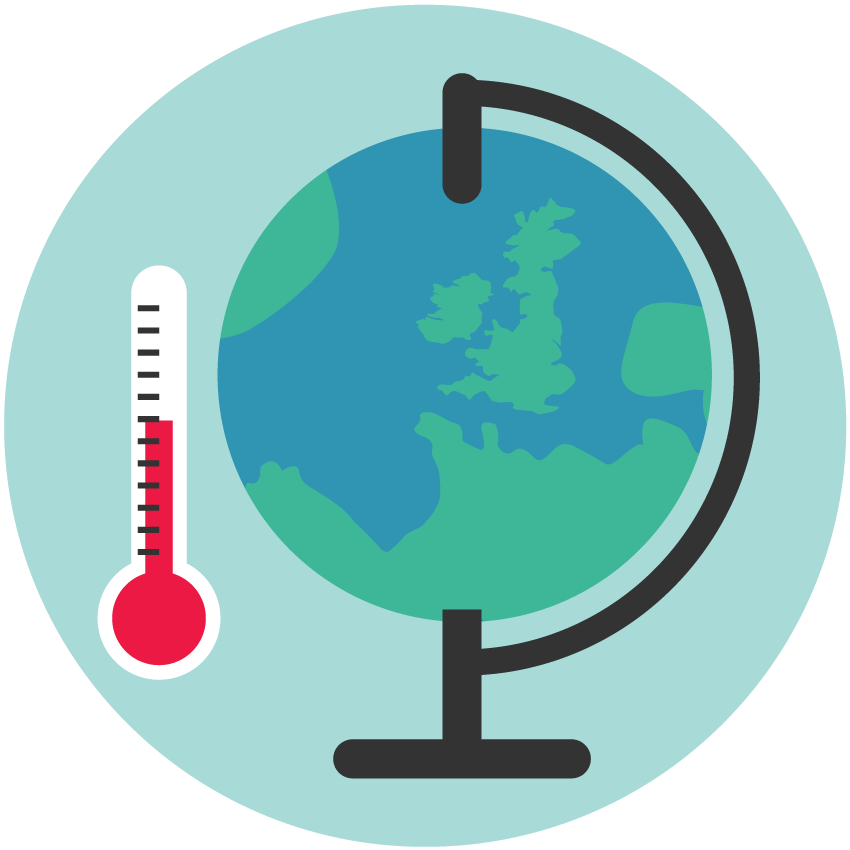Nearly 9 in 10 in Ireland see global warming as serious threat, and look to government and business to do more
- Nearly 9 in 10 people in Ireland continue to agree that global warming is a serious threat for humankind.
- Over 4 in 5 agree that Global Warming has contributed to more natural disasters.
- More than 1 in 3 think it is already too late to curtail climate change, with younger people being especially pessimistic.
- Over 3 in 4 people believe their personal actions can help to improve the environment, but only 1 in 4 totally agree.
- More than 3 in 5 are willing to pay more for a product that takes care of the environment.
- Nearly 3 in 4 agree that the real efforts on sustainability & environment need to be taken by business & government.
- Just less than 1 in 3 feel that governments are taking the necessary actions to take care of the environment.
WIN International, the world’s leading association in market research and polling, has published the Annual WIN World Survey (WWS – 2020) exploring the views and beliefs of 33,236 individuals among citizens from 39 countries across the globe about climate change. The survey analyzes views and opinions related to climate change and sustainability.
HEADLINES – IRELAND
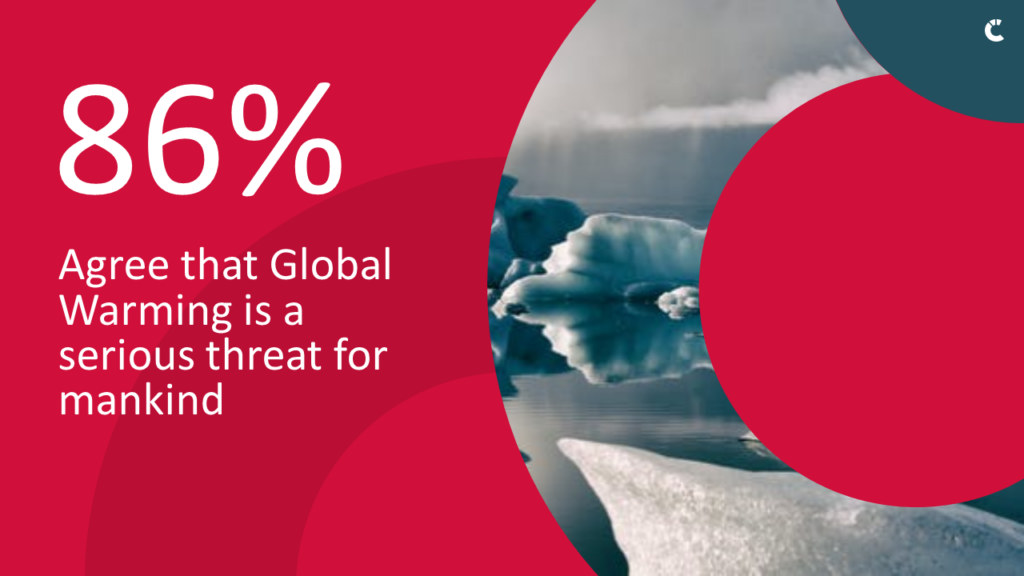
Global warming – a serious threat to humankind?
- Over half (58%) in Ireland totally agree that global warming is a serious threat to mankind, with a further 28% saying they agree somewhat.
- While the concern is overwhelming among all groups, those aged 55+ are slightly more worried (89%)
- Globally, Ireland sits slightly higher (+1%) than the global average of 85%, with top carbon emitters China and the United States having lowest level of agreement. Southeast Asian countries Vietnam (96%) and Indonesia (96%) have strongest agreement.
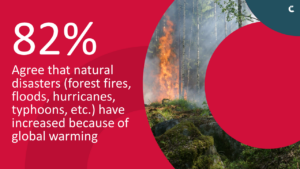
Increase in natural disasters due to global warming
- Overwhelming majority (82%) agree that natural disasters (forest fires, floods, hurricanes, typhoons, etc.) have increased because of global warming, with this demonstrating that the majority people are making the connection between human activity and the weather.
- Ireland is at the global average on their view on natural disasters, with some warmer nations such as Vietnam (96%) and Mexico (92%) featuring more prominently on the list.
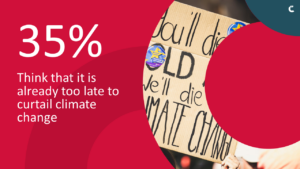
Too late to curtail the climate crisis?
- Over 1 in 3 (35%) now believe that it is already too late to curtail climate change, with 6% of people in total agreement. This represents a significant increase (+8%) since 2020 and a return to 2019 levels of agreement. This suggests a sense of despondency with the end of the pandemic and a perceived return to ‘business as usual’.
- The proportion of people who believe it is too late to curtail climate change has increased significantly from last year across most groups. Those aged 18-34 (45%) are most pessimistic with an increase of +12% since last year.
- Compared to the global average, the Irish are less pessimistic (-7%) about the prospects of solving the climate crisis in believing it is already too late to curtail climate change.
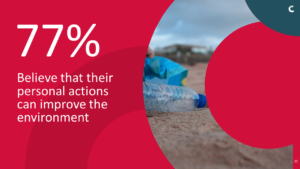
Taking personal responsibility for the climate crisis
- Over 3 in 4 people (77%) believe their personal actions can have influence in improving the environment, but only 26% are in total agreement.
- This marks a significant decline (-7%) compared to last year, with this drop observed across all demographics. Younger people (70%) demonstrate lowest level of agreement in believing their personal actions can make an impact.
- Globally, along with Ireland, France (71%), China (68%) & Japan (62%) also see significant declines versus 2020. Ireland is below the global average (-3%) of 80%.
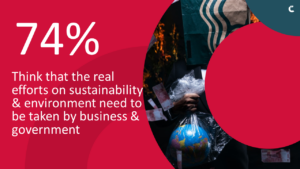
The responsibility of government and business
- Although over 3 in 4 believe their personal actions can influence the environment, nearly the same proportion feel that the real efforts on sustainability and environment need to be taken by business and government rather than individuals.
- This marks a significant increase (+6%) compared to 2020, with this driven by women, those aged 35+, and lower social grades.
- Ireland sits above the global average in this regard, South Korea (83%), Thailand (82%), and Lebanon (82%) ranking in the top 3.
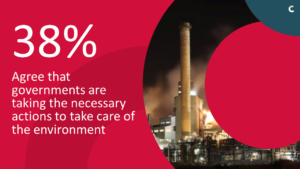
Necessary action taken by government?
- We see low level of agreement (38%) that governments are currently taking necessary actions to take care of the environment, with this agreement lowest in the Conn/Ulster region (31%).
- Compared to other countries, the Irish are less likely (-6%) to feel that governments are taking necessary actions, with lowest level of agreement in European nations Croatia (15%), Greece (24%), and Finland (24%).
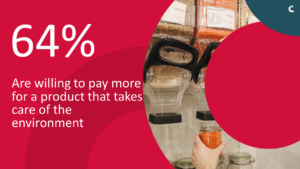
Willingness to pay more for products that takes care of the environment
- Over 2 in 3 are willing to spend more on products that are good for the environment, although only 1 in 10 totally agree with this. Those aged 55+ (71%) are the most willing group among all, with highest total agreement resting with 18-34-year-olds (18%).
- Compared to the global average (68%), the Irish are less likely to be willing to pay more (-4%). Paraguayans (90%) and Indians (88%) are most likely to be in agreement with this.
Sinead Mooney, Managing Director of RED C Research, said:
“Now that Covid is subsiding Irish people are once again focusing on climate change and the threat it poses to human existence. There is some sense that actions taken at an individual level are not sufficient and businesses and governments now need to take the lead in fighting climate change. People desire to live more sustainably but need assistance in making the sustainable choice easier, this is where business and government can help.”
HEADLINES WORLD
Climate change and sustainability
- Climate change remains a major concern for the world, with majority (85%) acknowledging the fact that global warming is a threat to mankind. The perception is slightly weak among some Asian countries like China (70%), Pakistan (73%), Philippines (74%) and Japan (75%), while Vietnam & Indonesia (96%) are at the top of the world ranking when it comes to perceived threat of global warming.
- The belief that it is too late to curtail the climate change has increased in most countries with overall agreement increasing by +6%.
- There is a slight drop (-5%) in global average in believing that personal action can change the environment. The countries where this perception has fallen drastically are France (71%), China (68%) & Japan (62%).
- Over 2 in 3 (68%) are willing to pay more for products that are eco-friendly. This is highest in Paraguay (90%), India (88%) & Indonesia (80%).
- 70% now agree that the real efforts on sustainability and environment need to be taken by business and government rather than individuals, with this higher than last year’s average by +3%.
- While people expect government to act, they currently do not think enough is being done. Only 44% feel that the government is taking the necessary steps. People in countries like Vietnam (95%), Indonesia (89%) & Philippines (82%) are happy with the government actions taken in their countries.
- Majority (81%) around the world agree that global warming is resulting in more occurrences of natural disasters in the recent times.
Vilma Scarpino, President of WIN International Association, said:
“The WIN Worldwide Survey evidences the increasing concern about climate change and an urgent call to action. People around the world believe that their actions can contribute but governments should take action. There is a strong perception that what is being done is not enough and it is not too late, although perceptions vary from country to country.”
-ENDS-
Media enquiries:
IRELAND DATA
Sinead Mooney, Managing Director, RED C Research
Derek Bell, Project Manager, RED C Research
+35318186316
[email protected]
WORLDWIDE DATA
Elena Crosilla, WIN Coordinator
+39 335.62.07.347
E-mail: [email protected]
NOTES FOR EDITORS
Methodology:
The survey was conducted in 39 countries using CAWI / online survey methods.
Sample Size and Mode of Field Work:
A total of 33,236 people were interviewed. See below for sample details. The fieldwork was conducted during 15th October 2021 and 18th December 2021. The margin of error for the survey is between 4.4 and 2.5 at 95% confidence level.
The global average has been computed according to the covered adult population of the surveyed countries.
In Ireland, a representative sample of over 1020 adults were conducted online. Fieldwork was conducted in November 2021.
Download the reports below:
WIN World Survey – Climate Change & Sustainability – Irish Summary Results
WIN World Survey – Climate Change & Sustainability – Press Release – January 2022
